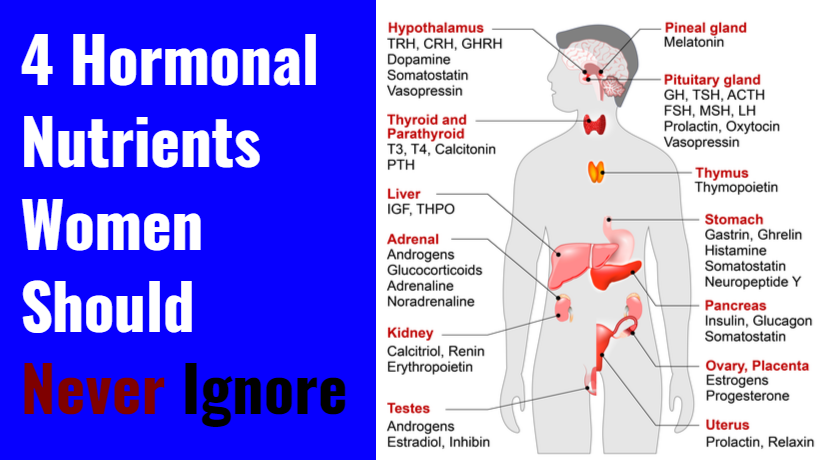Maintaining balanced hormone levels is an essential part of caring for your body. Fluctuations in these hormones can have major effects on the body’s health. When hormonal imbalances occur, these changes can contribute to an increase of mood swings, irritability, weight gain, appetite, and difficulty sleeping, among other health conditions.
Below are 4 essential nutrients to watch next time you’re going for your routine check-up. And, as always, if you are concerned you may be suffering from imbalanced hormone levels, please consult professional medical help immediately:
Insulin
As any diabetic knows, this hormone is essential for regulating the body’s metabolic processes. Made in the pancreas, a gland located behind the stomach, insulin is responsible for regulating the body’s absorption of glucose, a sugar found in carbohydrates, and keeping your blood-sugar levels balanced.
After a meal, the body’s digestive tract breaks down carbohydrates from food and changes them into glucose. Glucose is then absorbed into the body’s bloodstream through the lining in the small intestine. Once glucose is in the bloodstream, insulin causes cells throughout the body to absorb the sugar and use it for energy.
One of the most common issues people have with imbalanced insulin levels is diabetes. When the body does not produce enough insulin or use it efficiently, blood sugar levels build in the body. The body’s cells do not receive the energy they need from glucose, which can cause fatigue, dizziness, and fainting. When the body turns to other tissue for energy, such as fat or muscle, for energy, weight loss may occur.
Thyroxine
Found in both women and men, the thyroid gland is responsible for secreting a number of hormones that affect everything from heart health to metabolism. A crucial part of the endocrine system, this butterfly-shaped gland is found at the front of the neck.
Thyroxine, otherwise known as T4, is one of the most important hormones secreted by the thyroid. This hormone performs many functions, impacting nearly all of the body’s major systems, including heart and digestive function, metabolism, brain development, bone health, and muscle control.
Because of its major role in the body, issues with thyroxine can have big repercussions on the body’s overall health. Having too much thyroxine can lead to thyrotoxicosis, a condition that causes a goiter on the neck. On the other hand, having too little thyroxine can disrupt physical development in adolescence, as well as lower the body’s metabolic rate, cause weight gain, create memory problems, infertility, fatigue, and muscle stiffness.
Cortisol
Stressed out? Then this hormone, otherwise known as the “stress hormone,” may be all too familiar to you. Because most bodily cells have cortisol receptors, it affects many different functions in the body. The body releases cortisol during times of stress, raising the body’s heart rate, blood pressure, blood glucose levels, respiration, muscle relaxation, and memory formulation. Furthermore, in pregnant individuals, cortisol also supports the developing fetus during pregnancy
When cortisol levels are too high or too low, the body can experience major issues. In situations where blood levels are too high, individuals can develop Cushing syndrome. People with Cushing Syndrome can experience rapid weight gain in the face, abdomen, and chest. Cushing syndrome can also cause high blood pressure, skin changes, osteoporosis, and mood swings.
Moreover, low cortisol levels can cause a condition known as primal adrenal insufficiency. Although uncommon, this condition is an autoimmune disease that attacks the adrenal glands. Symptoms include fatigue, muscle loss, weight loss, mood swings, and changes to the skin.
Estrogen
Regardless of your biological sex, estrogen plays an important role in all bodies of every gender. This hormone contributes to cognitive health, bone health, the function of the cardiovascular system, as well as other essential bodily processes.
In women, estrogen is produced in the ovaries, adrenal glands, and fat tissues. It helps develop and maintain both the reproductive system and feminine characteristics, such as breasts and pubic hair.
Although estrogen levels naturally fluctuate throughout women’s lifetime, irregular changes in estrogen levels can have a significant impact on the body’s overall health. Imbalance in this hormone can lead to any of the following symptoms in women:
- irregular or no menstruation
- light or heavy bleeding during menstruation
- more severe premenstrual or menopausal symptoms
- hot flashes, night sweats, or both
- noncancerous lumps in the breast and uterus
- mood changes and sleeping problems
- weight gain, mainly in the hips, thighs, and waist
- low sexual desire
- vaginal dryness and vaginal atrophy
- fatigue
- mood swings
- feelings of depression and anxiety
- dry skin
Although some of these symptoms are quite common during menopause, if you are concerned you may be suffering from an unnatural estrogen imbalance, it is recommended to seek help from a professional doctor.



